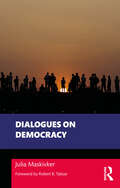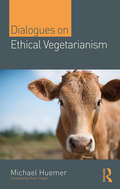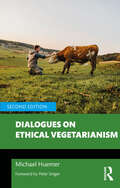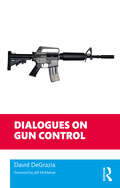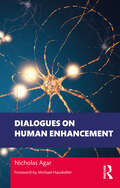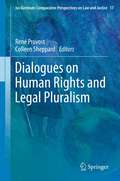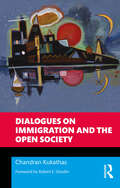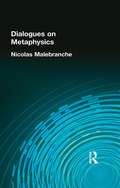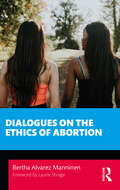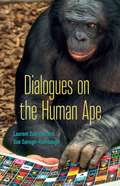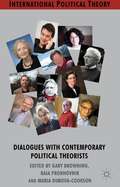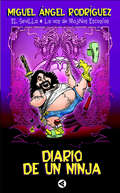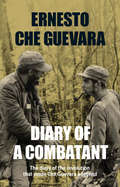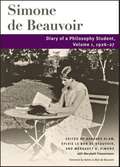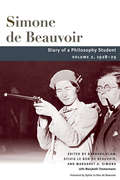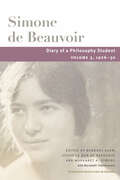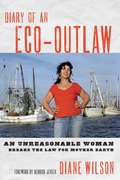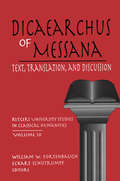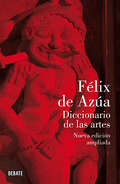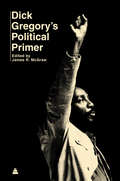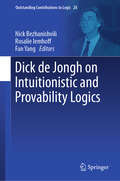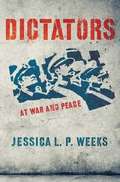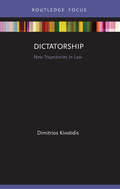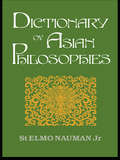- Table View
- List View
Dialogues on Democracy (Philosophical Dialogues on Contemporary Problems)
by Julia MaskivkerDialogues on Democracy offers a panoramic overview of recent and classical debates on the meaning of democracy as a philosophical ideal. It features some of the most central discussions that exist in the literature regarding its value, its purpose, and its (possible) flaws.Accessibly written and efficiently organized, the book is structured around a fictional conversation involving four participants: a teacher of philosophy and political theory and three of her most notable and dedicated students. Their dialogues capture the essence of some of the most powerful objections and counter objections to democracy and its institutions, allowing the reader to understand the origins and logic of much philosophical thinking concerned with political life. Maskivker provides succinct but highly informative arguments in defense of democracy while deftly addressing serious questions regarding its legitimacy coming from diverse corners of the ideological spectrum. The discussion addresses issues concerned with the justification and institutional plausibility of collective government, citizen equality, political representation, citizen action, civic virtue, and many other themes.Perfectly suited for a first introduction to the philosophical analysis of democracy, the book covers extensive ground in an instructive and dynamic way. In the book, Maskivker also offers her own novel insights regarding the value of democracy and its distinct interpretations – a contribution that makes the book all the more interesting and complete.Key Features: Introduces important thinkers in the contemporary debate about theories of democracy Assumes no background knowledge of philosophy or political theory Written in an engaging dialogue format between four fictional characters: a teacher of philosophy and political theory and three of her most notable and dedicated students.
Dialogues on Ethical Vegetarianism
by Michael HuemerAfter lives filled with deep suffering, 74 billion animals are slaughtered worldwide every year on factory farms. Is it wrong to buy the products of this industry? In this book, two college students – a meat-eater and an ethical vegetarian – discuss this question in a series of dialogues conducted over four days. The issues they cover include: how intelligence affects the badness of pain, whether consumers are responsible for the practices of an industry, how individual choices affect an industry, whether farm animals are better off living on factory farms than not existing at all, whether meat-eating is natural, whether morality protects those who cannot understand morality, whether morality protects those who are not members of society, whether humans alone possess souls, whether different creatures have different degrees of consciousness, why extreme animal welfare positions "sound crazy," and the role of empathy in moral judgment. The two students go on to discuss the vegan life, why people who accept the arguments in favor of veganism often fail to change their behavior, and how vegans should interact with non-vegans. A foreword, by Peter Singer, introduces and provides context for the dialogues, and a final annotated bibliography offers a list of sources related to the discussion. It offers abstracts of the most important books and articles related to the ethics of vegetarianism and veganism. Key Features: Thoroughly reviews the common arguments on both sides of the debate. Dialogue format provides the most engaging way of introducing the issues. Written in clear, conversational prose for a popular audience. Offers new insights into the psychology of our dietary choices and our responsibility for influencing others.
Dialogues on Ethical Vegetarianism (Philosophical Dialogues on Contemporary Problems)
by Michael HuemerWorldwide every year, 83 billion animals are slaughtered on factory farms, at the end of brief lives full of suffering. Is it wrong to buy the products of this industry?In this book, two college students – a meat-eater and an ethical vegetarian – discuss this question in a series of dialogues conducted over five days. Issues covered include: how intelligence affects the badness of pain, whether consumers are responsible for the practices of the industry, how individual choices affect an industry, whether farm animals are better off living on factory farms than not existing at all, whether meat-eating is natural, whether morality protects those who cannot understand morality, whether morality protects those who are not members of society, whether humans alone possess souls, whether different creatures have different degrees of consciousness, why extreme animal welfare positions "sound crazy," and the role of empathy in moral judgment. The two go on to discuss the vegan life, why people who accept the arguments often fail to change their behavior, and how vegans should interact with non-vegans.This Second Edition also covers many new topics, including: Satisfying nutritional needs with plant-based foods The overall health effects of vegetarian diets The consumer costs of a plant-based diet Synthetic meat Food deserts Christian-inspired arguments for and against veganism Progressive-inspired arguments for and against veganism A new appendix offers readers delicious vegan recipes, including ones for Carrot Ginger Soup, Avocado Toast, Compassionate Chili, and The Smoothie of the Gods. Key Features: Thoroughly reviews the common arguments on both sides of the debate Dialogue format provides the most engaging way of introducing the issues Written in clear, conversational prose for a popular audience Offers new insights into the psychology of our dietary choices and our responsibility for influencing others New in this edition, several easy and delicious vegan recipes
Dialogues on Gun Control (Philosophical Dialogues on Contemporary Problems)
by David DeGraziaWhat happens when two intelligent American college students with different attitudes about guns launch into a careful exploration of the ethics of gun policy? What might a European exchange student add to the mix? All three characters in this book are fictional, the creation of author David DeGrazia’s imagination. But their vigorous, respectful conversations over six meetings—well-informed by the latest empirical data and the best available philosophical arguments—shed needed light on the reality of guns in the U.S. today. These dialogues introduce students, professional academics, and others to the American experience with gun violence and gun policy, articulating ethical arguments supporting and opposing substantial gun control, and specific possibilities for reform. They also demonstrate how those who initially disagree about the place of guns in American society can communicate constructively and agree on many ideas. Dialogue 1 distinguishes the legal rights to private gun ownership from the ethics of gun policy and illustrates how the U.S. is an outlier with respect to gun violence, gun ownership, and gun politics. Dialogue 2 explores the overall social consequences of high rates of gun ownership and minimal regulation and enforcement. Then, turning to moral rights, Dialogue 3 probes the subtle relationships among a right to self-defense, its possible foundation(s), and alleged gun rights. Dialogue 4 turns to appeals to various liberties as possible bases for gun rights. Next, Dialogue 5 examines the possibility that various other moral rights—such as a right to a reasonably safe environment—can illuminate gun policy ethics. Finally, Dialogue 6 concludes with a fairly detailed exploration of the shape of morally defensible gun policy in the United States. Key features: Dialogue format provides an engaging and accessible exchange throughout the book. Depth of the ethical analysis refutes those who believe the issues pertaining to guns are simple. Up-to-date references and examples make the book more current than the competition.
Dialogues on Human Enhancement (Philosophical Dialogues on Contemporary Problems)
by Nicholas AgarWe face an emerging range of technologies that can be applied to our human natures with the goal of enhancing us. There are nootropic smart drugs and gene editing that influence the development of the brain. The near future promises cybernetic technologies that can be grafted onto our brains and bodies. The challenge for readers of Dialogues on Human Enhancement is to decide how to respond to these and other coming enhancement technologies. As you read these dialogues you will meet passionate advocates for a variety of responses to enhancement tech, ranging from blanket rejection to ecstatic endorsement. You’ll encounter Olen, for whom there is no such thing as too much enhancement. You’ll meet Winston, a bioconservative who fiercely but also imaginatively opposes any human enhancement. And there is the moderate Eugenie, who strives to distinguish between enhancement technologies that should and should not be accepted. As these characters philosophically engage with each other they will benefit from the supervisory presence of Sophie, the philosopher. Dialogues on Human Enhancement does not arrive at a single conclusion. Olen’s transhumanism, Eugenie’s moderation, and Winston’s bioconservatism are presented as viable and necessary views as we enter a future made uncertain by human enhancement tech. And the book also welcomes the voices of students, even – and especially – if they challenge the opinions of our age’s experts. As students join the conversations in this book, they will formulate their own views about how humanity could or should be in our Age of Human Enhancement.
Dialogues on Human Rights and Legal Pluralism
by Colleen Sheppard René ProvostHuman rights have transformed the way in which we conceive the place of the individual within the community and in relation to the state in a vast array of disciplines, including law, philosophy, politics, sociology, geography. The published output on human rights over the last five decades has been enormous, but has remained tightly bound to a notion of human rights as dialectically linking the individual and the state. Because of human rights' dogged focus on the state and its actions, they have very seldom attracted the attention of legal pluralists. Indeed, some may have viewed the two as simply incompatible or relating to wholly distinct phenomena. This collection of essays is the first to bring together authors with established track records in the fields of legal pluralism and human rights, to explore the ways in which these concepts can be mutually reinforcing, delegitimizing, or competing. The essays reveal that there is no facile conclusion to reach but that the question opens avenues which are likely to be mined for years to come by those interested in how human rights can affect the behaviour of individuals and institutions.
Dialogues on Immigration and the Open Society (Philosophical Dialogues on Contemporary Problems)
by Chandran KukathasAfter some friendly pestering from six of his students curious about his thinking about immigration, a philosophy professor invites them to present their own ideas to him over a series of meetings throughout the term. This book is about their conversations.These dialogues introduce the reader to the most important ethical and political questions about immigration. They begin by considering the claim that significant levels of immigration pose a threat to the very civilization of the West, where the immigration issue is a particularly vexed one. The chapters that follow consider the economics of immigration, whether or not the state is justified in its efforts—or even obliged—to control immigration, and whether everyone has a right to move or if only refugees can make so strong a claim. The final chapter considers the implications of a philosophy of immigration on the ideal of an open society. Throughout the book, there is a strong emphasis on addressing the conceptual questions that are vital for making any headway in understanding practical issues. What is a refugee? What are rights? What is an open society? Indeed, what is immigration?Key Features: Written as a friendly engagement between six thoughtful but skeptical students who hold a variety of views, and a philosophy professor, who insists he’s just trying to work out the answers with their help rather than convince them of one right answer; Engages with the immigration debates in philosophy, economics and politics, without presupposing any specialist knowledge; Includes discussion of the historical and institutional aspects of immigration, so the conversation is never simply about abstract or hypothetical cases; Concludes with a substantive theory about how to think about immigration and the free society to prompt further reflection.
Dialogues on Metaphysics (Muirhead Library Of Philosophy Ser.)
by Malebranche, NicolasFirst published in 2002. Routledge is an imprint of Taylor & Francis, an informa company.
Dialogues on the Ethics of Abortion (Philosophical Dialogues on Contemporary Problems)
by Bertha Alvarez ManninenWhat happens when two intelligent and highly informed fictional college students, one strongly pro-choice and the other vigorously pro-life, are asked to put together a presentation on abortion? Their conversations over five days – friendly but lively, charitable but clear – are captured in this book. Through these dialogues, students and other interested readers are introduced to the difficult moral issues of abortion. In Chapter 1, readers learn about Roe v. Wade and other relevant legal cases. Chapter 2 covers basic, philosophical issues such as: What is a person? Are fetuses persons? Is fetal potential morally relevant? How shall we define the moral community? Chapter 3 introduces students to Don Marquis’s "Why Abortion is Immoral" and also the metaphysical issues of personal identity and its relevance to abortion. Chapter 4 covers Judith Jarvis Thomson’s "A Defense of Abortion", including objections and responses to the argument from bodily autonomy. Finally, Chapter 5 looks at abortion in hard cases, such as in cases of rape, fetal disability, non-viable pregnancies, and sex-selection; the chapter also includes a conversation on fathers and abortion. With a Foreword by Laurie Shrage, topics headings in the margins, and an annotated bibliography, Dialogues on the Ethics of Abortion is an easy-to-use volume and valuable resource for anyone interested in a fair and clear-headed approach to one of the most contentious moral issues of our time.
Dialogues on the Ethics of Abortion (Philosophical Dialogues on Contemporary Problems)
by Bertha Alvarez ManninenWhat happens when two intelligent and highly informed fictional college students, one strongly pro-choice and the other vigorously pro-life, are asked to put together a presentation on abortion? Their conversations over five days – friendly but lively, charitable but clear – are captured in this book. Through these dialogues, students and other interested readers are introduced to the difficult moral issues of abortion. In Chapter 1, readers learn about Roe v. Wade and other relevant legal cases. Chapter 2 covers basic, philosophical issues such as: What is a person? Are fetuses persons? Is fetal potential morally relevant? How shall we define the moral community? Chapter 3 introduces students to Don Marquis’s "Why Abortion is Immoral" and also the metaphysical issues of personal identity and its relevance to abortion. Chapter 4 covers Judith Jarvis Thomson’s "A Defense of Abortion", including objections and responses to the argument from bodily autonomy. Finally, Chapter 5 looks at abortion in hard cases, such as in cases of rape, fetal disability, non-viable pregnancies, and sex-selection; the chapter also includes a conversation on fathers and abortion. With a Foreword by Laurie Shrage, topics headings in the margins, and an annotated bibliography, Dialogues on the Ethics of Abortion is an easy-to-use volume and valuable resource for anyone interested in a fair and clear-headed approach to one of the most contentious moral issues of our time.
Dialogues on the Human Ape (Posthumanities)
by Laurent Dubreuil Sue Savage-RumbaughA primatologist and a humanist together explore the meaning of being a &“human animal&”Humanness is typically defined by our capacity for language and abstract thinking. Yet decades of research led by the primatologist Sue Savage-Rumbaugh has shown that chimpanzees and bonobos can acquire human language through signing and technology. Drawing on this research, Dialogues of the Human Ape brings Savage-Rumbaugh into conversation with the philosopher Laurent Dubreuil to explore the theoretical and practical dimensions of what being a &“human animal&” means. In their use of dialogue as the primary mode of philosophical and scientific inquiry, the authors transcend the rigidity of scientific and humanist discourses, offering a powerful model for the dissemination of speculative hypotheses and open-ended debates grounded in scientific research.Arguing that being human is an epigenetically driven process rather than a fixed characteristic rooted in genetics or culture, this book suggests that while humanness may not be possible in every species, it can emerge in certain supposedly nonhuman species. Moving beyond irrational critiques of ape consciousness that are motivated by arrogant, anthropocentric views, Dialogues on the Human Ape instead takes seriously the continuities between the ape mind and the human mind, addressing why language matters to consciousness, free will, and the formation of the &“human animal&” self.
Dialogues with Contemporary Political Theorists
by Gary Browning Raia Prokhovnik Maria Dimova-CooksonA lively and engaging collection which explains the various strands of political theory, identifies key futures trends and explores the foundations of contemporary debate. Features interviews with pre-eminent theorists, including Quentin Skinner, Carole Pateman and Alex Honneth.
Diario de un ninja: El Sevilla. La voz de Mojinos Escozíos
by Miguel Ángel RodríguezDiario de un ninja, escrito por Miguel Ángel Rodríguez con ese tono humorístico que solo él sabe lograr, narra la historia de un ninja que tiene la obligación moral de ayudar a la gente. Miguel Ángel Rodríguez, El Sevilla, nació en el año del Perro según el calendario chino, cosa que lo marcó desde la infancia. Aprendió artes marciales y técnicas de defensa personal en la prestigiosa escuela GGG de estudios por correspondencia. El primer día le regalaron una guitarra, solo por haberse matriculado, y en los meses siguientes lo educaron para convertirse en un ninja de primera división. Influenciado por la forma de pensar de Lee Tan Chú (pinche de cocina del restaurante chino que había en su barrio), escribió el libro titulado Como te acerques, te parto la cara, aunque nunca llegó a publicarse por motivos ajenos a su voluntad. El Sevilla da charlas en institutos y universidades para que los jóvenes conozcan la vida de los guerreros japoneses, aunque nunca asiste nadie a ellas. Ahora nos amenaza con este libro en el que cuenta sus experiencias como ninja, obra que, según el propio autor, es algo menos aburrida que una película japonesa.
Diary of a Combatant
by Ernesto Che GuevaraThe publication of this title by Ocean Sur in Spanish in July 2011 provoked considerable international attention (including CNN). This never-before-published diary (comprising a dozen small notebooks) Ernesto Che Guevara kept during the guerrilla war in Cuba when he joined the struggle to overthrow the Batista dictatorship that led to the 1959 revolution has now been meticulously transcribed by his widow, Aleida March.Why did it take over fifty years for this diary to be published? Maybe because of some caustic comments Che makes in his usual brutally frank style. Maybe it was felt appropriate to wait until Fidel Castro had produced his own memoirs (now published by Ocean Press as The Strategic Victory).In launching the book in Havana in July 2011, editor Maria del Carmen Ariet marked that it was "never clear whether or not Che wanted these diaries published" as he had reworked several pieces into his famous Reminiscences of the Cuban Revolutionary War, on which Steven Soderbergh based part one of his epic movie Che, starring Benicio Del Toro.Nevertheless, all Che's diaries-from his early Motorcycle Diaries and its sequel, Latin America Diaries, through to his last diary from Bolivia-are extraordinary examples of his literary gift and his political incisiveness, in terms of his personal reflections, his criticisms and self-criticism, and his observations about others and events.Other features of this new book are fifty-eight unpublished photos from Che's personal archive and unpublished letters (including correspondence between Che and Fidel), an index, and extensive glossary.
Diary of a Philosophy Student: Volume 1, 1926-27
by Simone De Beauvoir Sylvie Le Beauvoir Margaret A. Simons Marybeth Timmermann Barbara KlawRevelatory insights into the early life and thought of the preeminent French feminist philosopher Dating from her years as a philosophy student at the Sorbonne, this is the 1926-27 diary of the teenager who would become the famous French philosopher, author, and feminist, Simone de Beauvoir. Written years before her first meeting with Jean-Paul Sartre, these diaries reveal previously unknown details about her life and offer critical insights into her early philosophy and literary works. Presented here for the first time in translation and fully annotated, the diary is completed by essays from Barbara Klaw and Margaret A. Simons that address its philosophical, historical and literary significance. The volume represents an invaluable resource for tracing the development of Beauvoir's independent thinking and influence on the world.
Diary of a Philosophy Student: Volume 2, 1928-29 (Beauvoir Series)
by Simone Beauvoir"That’s when everything started," Simone de Beauvoir wrote in an entry dated July 8, 1929. On that day, her relationship with Jean-Paul Sartre began. This second volume of Beauvoir's Diary of a Philosophy Student takes readers into smoky dorm rooms and inter-war Paris as it continues the feminist philosopher's coming-of-age story. Here are Beauvoir's famous sparring sessions with Sartre in the Luxembourg Gardens--teasing him while stoking her burgeoning intellectual strength. Here also are her friendships and academic challenges, the discovery of important future influences like Barrès and Hegel, and her early forays into formulating the problem of the Other. In addition to the diary, the editors provide invaluable supplementary material. A trove of footnotes and endnotes elaborates on virtually every reference made by Beauvoir, offering an atlas of her knowledge and education while at the same time allowing readers to share her intellectual and cultural milieu. Translator and scholar Barbara Klaw also contributes an introduction on reading Beauvoir's diaries as a philosophy of self-help.
Diary of a Philosophy Student: Volume 3, 1926-30 (Beauvoir Series #3)
by Simone de BeauvoirWritten between the age of eighteen and twenty-one, the entries in the third volume of Diary of a Philosophy Student take readers into Simone de Beauvoir’s thoughts while illuminating the people and ideas swirling around her. The pages offer rare insights into Beauvoir’s intellectual development; her early experiences with love, desire, and freedom; and relationships with friends like Élisabeth “Zaza” Lacoin, and Maurice Merleau-Ponty. It also presents Beauvoir’s shocking account of Jean-Paul Sartre’s sexual assault of her during their first sexual encounter--a revelation certain to transform views of her life and philosophy. In addition, the editors include a wealth of important supplementary material. Barbara Klaw provides a detailed consideration of the Diary’s role in the development of Beauvoir’s writing style by exploring her use of metanarrative and other literary techniques, part of a process of literary creation that saw Beauvoir use the notebooks to cultivate her talent. Margaret A. Simons’s essay places the assault by Sartre within an appraisal of Beauvoir’s complicated legacy for #MeToo while suggesting readers engage with the diary through the lens of trauma.
Diary of an Eco-outlaw: An Unreasonable Woman Breaks the Law for Mother Earth
by Diane WilsonDiane Wilson is an activist, shrimper, and all around hell-raiser whose first book, An Unreasonable Woman, told of her battle to save her bay in Seadrift, Texas. Back then, she was an accidental activist who worked with whistleblowers, organized protests, and eventually sunk her own boat to stop the plastic-manufacturing giant Formosa from releasing dangerous chemicals into water she shrimped in, grew up on, and loved. But, it turns out, the fight against Formosa was just the beginning. In Diary of an Eco-Outlaw, Diane writes about what happened as she began to fight injustice not just in Seadrift, but around the world--taking on Union Carbide for its failure to compensate those injured in the Bhopal disaster, cofounding the women's antiwar group Code Pink to protest the wars in Iraq and Afghanistan, attempting a citizens arrest of Dick Cheney, famously covering herself with fake oil and demanding the arrest of then BP CEO Tony Hayward as he testified before Congress, and otherwise becoming a world-class activist against corporate injustice, war, and environmental crimes. As George Bernard Shaw once said, "all progress depends on unreasonable women." And in the Diary of an Eco-Outlaw, the eminently unreasonable Wilson delivers a no-holds-barred account of how she--a fourth-generation shrimper, former boat captain, and mother of five--took a turn at midlife, unable to stand by quietly as she witnessed abuses of people and the environment. Since then, she has launched legislative campaigns, demonstrations, and hunger strikes-and generally gotten herself in all manner of trouble. All worth it, says Wilson. Jailed more than 50 times for civil disobedience, Wilson has stood up for environmental justice, and peace, around the world--a fact that has earned her many kudos from environmentalists and peace activists alike, and that has forced progress where progress was hard to come by.
Dicaearchus of Messana: Volume 10 (Rutgers University Studies in Classical Humanities)
by Eckart SchütrumpfDicaearchus of Messana (fl. c. 320 b.c.) was a peripatetic philosopher. Like Theophrastus of Eresus, he was a pupil of Aristotle. Dicaearchus's life is not well documented. There is no biography by Diogenes Laertius, and what the Suda offers is meager. However, it can be ascertained that a close friendship existed between Aristoxenus and Dicaearchus as both are mentioned as personal students of Aristotle.Dicaearchus lived for a time in the Peleponnesus, and in his pursuit of geographical studies and measuring mountains, he is said to have enjoyed the patronage of kings. Dicaearchus's interests were in certain respects narrower than Aristotle's. There is no evidence that Dicaearchus worked in logic, physics, or metaphysics. To the contrary, his work On the Soul recalls the Aristotelian treatise of the same title, but Dicaearchus's work was not an esoteric treatise. Instead, it was a dialogue in two parts. His interest in good and bad lifestyles also found expression in works such as On the Sacrifice at Ilium, and On the Destruction of Human Beings, in which he presented man himself as the greatest threat to mankind. In On Lives, a work of at least two books, he considered philosophers and others noted for their wisdom, with his main thesis being the superiority of the active life over that of quiet contemplation. Cicero speaks of controversy between Dicaearchus and Theophrastus the former championing the active life and the latter that of contemplation. Circuit of the Earth was a work of descriptive geography in which Dicaearchus said that the earth has the shape of a globe. This interest in earth's sphericity led him to make maps and discuss other phenomena like the cause of ebb- and flood-tides and the source of the Nile River. The largest number of texts in the collection deal with cultural history, most of which stem or appear to stem from his Life of Greece, while the smallest section deals with politics.This tenth volume in the series Rutgers Studies in Classical Humanities includes a facing translation of the Greek and Latin texts, making the material accessible to readers who lack the ancient languages, and the accompanying essays introduce important issues beyond the scope of the text.
Diccionario de las artes (nueva edición ampliada)
by Félix de AzúaLa visión del arte de uno de los mejores escritores y más agudos pensadores de España. Diccionario de las artes es ya un clásico de la estética que ahora Félix de Azúa ha ampliado y revisado exhaustivamente para esta edición. A pesar de su título, el libro no es un diccionario al uso, sino un ensayo compuesto por diversas voces, dispuestas alfabéticamente, donde el autor medita acerca del ocaso del Arte. Para ello, regresa a los lugares del crimen, es decir, las artes y las ideas que han generado a lo largo de la historia, ese largo viaje en el que el hombre ha ido representándose y abstrayéndose a sí mismo hasta llegar a la extenuación actual. Con una estructura y un ritmo que recuerda a las variaciones musicales, Félix de Azúa, uno de los escritores más brillantes de nuestro tiempo, despliega el espectro semántico que ha generado el Arte y lo somete a una nueva formulación. La belleza, la muerte, lo sagrado o lo sublime se declinan en estas páginas a la par que se muestran los efectos, creativos o destructivos, del mercado, la publicidad y los medios de comunicación. Más que un ensayo de arte, Azúa ha concebido en esta obra imprescindible una bella y lúcida reflexión sobre la condición humana.
Dick Gregory's Political Primer
by Dick Gregory James R. McGrawA unique and timeless guide to American government and its electoral process—as relevant today as when it was first published in 1972—from the voice of black consciousness, cultural icon Dick Gregory, the incomparable satirist, human rights and environmental activist, health advocate, social justice champion, and author of the NAACP Image Award–winning Defining Moments in Black History: Reading Between the Lies and the classic bestseller Nigger: An Autobiography.For most of his life, Richard Claxton “Dick” Gregory worked to educate Americans about the issues—and the forces of power—shaping their lives. A brilliant and informed student of the American experiment, he viewed and understood politics with an acuity few possess. Nearly fifty years ago, on the eve of Richard M. Nixon’s reelection, he wrote a classic guide to the American political system for ordinary folks. Today, when American democracy is threatened, his primer is more necessary than ever before. In Dick Gregory’s Political Primer, Gregory presents a series of lessons accompanied by review questions to educate and empower every citizen. He provides amusing, concise, and clear information and commentary on the nature of political parties, the three branches of government and how they operate, how the campaign process works and the costs, and more. Gregory offers imaginative comparisons such as the Hueys—Long, the populist Louisiana governor and Newton, the cofounder of the Black Panthers—and numerological parallels between Abraham Lincoln and John F. Kennedy. He also includes a trenchant glossary that offers insights into some of the major players, terms, and institutions integral to our democracy and government. An essential guide to American history unlike any other, Dick Gregory’s Political Primer joins the ranks of classics such as Howard Zinn’s A People’s History of the United States, and is essential reading for every American.
Dick de Jongh on Intuitionistic and Provability Logics (Outstanding Contributions to Logic #28)
by Fan Yang Rosalie Iemhoff Nick BezhanishviliThis book is dedicated to Dick de Jongh’s contributions to the theory of intuitionistic and provability logics. Consisting of 13 chapters, written by leading experts, this book discusses de Jongh’s original contributions and consequent developments that have helped to shape these fields. The book begins with an autobiographic note by Dick de Jongh, which discusses the main themes of his work and places the other contributions in context. The next four chapters explore the De Jongh-Sambin fixed point theorem and other contributions to provability and interpretability logics. The following four chapters focus on modal, intuitionistic and intuitionistic modal logics. They discuss independence of formulas, unification and de Jongh formulas in intuitionistic and modal logics. Then there follow two chapters on the other two areas to which Dick de Jongh made important contributions: the theory of well-partial orders, and formal learning theory. The second to last chapter on Origami Geometry can be seen as representing the Master of Logic program of the Institute for Logic, Language and Computation (ILLC) in which de Jongh invested a lot of energy. The book ends with a complete bibliography of Dick de Jongh in the last chapter. This volume provides a vital overview – and continuation of - de Jongh’s prolfic work in the theory of intuitionistic and provability logics.
Dictators at War and Peace
by Jessica L. WeeksWhy do some autocratic leaders pursue aggressive or expansionist foreign policies, while others are much more cautious in their use of military force? The first book to focus systematically on the foreign policy of different types of authoritarian regimes, Dictators at War and Peace breaks new ground in our understanding of the international behavior of dictators. Jessica L. P. Weeks explains why certain kinds of regimes are less likely to resort to war than others, why some are more likely to win the wars they start, and why some authoritarian leaders face domestic punishment for foreign policy failures whereas others can weather all but the most serious military defeat. Using novel cross-national data, Weeks looks at various nondemocratic regimes, including those of Saddam Hussein and Joseph Stalin; the Argentine junta at the time of the Falklands War, the military government in Japan before and during World War II, and the North Vietnamese communist regime. She finds that the differences in the conflict behavior of distinct kinds of autocracies are as great as those between democracies and dictatorships. Indeed, some types of autocracies are no more belligerent or reckless than democracies, casting doubt on the common view that democracies are more selective about war than autocracies.
Dictatorship: New Trajectories in Law (New Trajectories in Law)
by Dimitrios KivotidisThis book analyses the institution and concept of dictatorship from a legal, historical and theoretical perspective, examining the different types of dictatorship, their relationship to the law, as well as the analytical value of the concept in contemporary world. In particular, it seeks to codify the main theories and conceptions of ‘dictatorship’, with the goal of unearthing their contradictions. The book’s main premise is that the concept of dictatorship and the different types of the dictatorial form have to be assessed and can only be understood in their historical context. On this basis, the elaborations on dictatorship of such diverse thinkers as Carl Schmitt, Donoso Cortes, Karl Marx, Ernst Fraenkel, Franz Neumann, Nicos Poulantzas, and V. I. Lenin, are discussed in their historical context: ‘classical and Caesaristic dictatorship’ in ancient Rome, ‘dictatorship’ in revolutionary France of 1789 and counterrevolutionary France of 1848, ‘fascist dictatorship’ in Nazi Germany, and ‘dictatorship of the proletariat’ in Russia of 1917. The book contributes to the theory of dictatorship as it outlines the contradictions of the different typologies of the dictatorial form and seeks to explain them on the basis of the concept of ‘class dictatorship’. The book’s original claim is that the dictatorial form, as a modality of class rule that relies predominantly on violence and repression, has been essential to the reproduction of bourgeois rule and, consequently, of capitalist social relations. This function has given rise to different types and conceptualisations of dictatorship depending on the level of capitalist development. This book is addressed to anyone with an interest in law, political theory, political history and sociology. It can serve as core text for courses that seek to introduce students to the institution or theory of dictatorship. It may also serve as a reference text for post-graduate programs in law and politics, because of its interdisciplinary and critical approach.
Dictionary of Asian Philosophies
by St. Elmo Nauman JrSpanning three thousand years and five major cultures, the traditions of Eastern philosophy play a major role in any study of human thought today; to ignore the East is to miss the valuable insights of philosophers from the Persian, Indian, Chinese, Tibetan and Japanese traditions. In this book, every major stream of Eastern thought, whether idealistic or materialistic, is presented. The author reveals here the wisdom of the East, from Avicenna to Zoroaster, from Buddha to Gandhi. Entries cover not only the philosophers themselves but also the philosophical terms and concepts, the historical background, the doctrines, teachings and writings of the East. Whether we wish to consult the I Ching, to understand Zen koan, or to read from the Upanishads, this volume will be a valuable tool in our quest.
